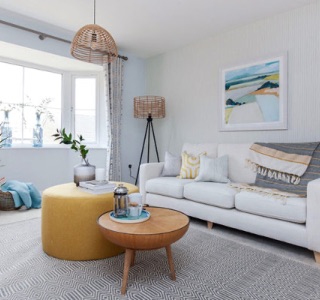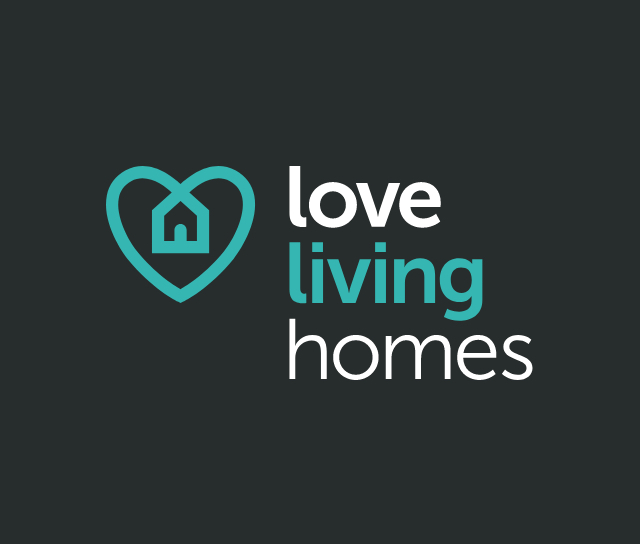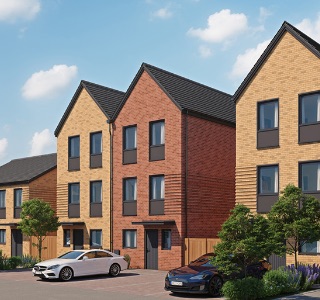Service charges
Frequently Asked Questions
Services charges are fees that cover services in communal or shared areas.
One of the key aspects of being a shared owner or a 100% leaseholder (you own the property outright, but a 3rd party own the building freehold) is that you will be required to pay a service charge.
You pay a share of the cost of maintaining the communal area of your development, either for your building or the estate. It is important to understand how service charges work, are calculated, charged and your rights and responsibilities. We aim to be transparent with you over the costs involved in being a leaseholder, as buying your new home is a big financial decision.
Developments by us are managed by Town & Country Housing Association under our Love Living Homes brand.
Therefore once you become a resident with us, all payments that you make (including service charges) are managed by Town & Country Housing Association.
Some developments in which your home is located were built by us, whereas others were built by private developers.
Developments built by us are managed by Town & Country Housing Association under our Love Living brand.
In private developments the developer may appoint an external managing agent (EMA) to manage the building or estate, rather than by us. Developments may have both an EMA and us managing the area, for example, the EMA may manage the estate, and we manage our buildings.
EMA’s will also produce the service charges for the development. There are a few differences between developments managed by us and those managed by an external managing agent.
Below is a list of some of the main differences.
Love Living Homes (or Town and Country Housing) managed developments:
- We set the service charge budget
- We charge a management fee to cover our costs
- We manage and control all the communal area services, maintenance and repairs in the development
External Managing Agent (EMA) managed developments:
- The EMA sets up the service charge budget. We analyse this budget, and challenge where necessary but ultimately the charges levied can vary substantially between different EMAs, as well as be somewhat different to those we would charge
- The EMA charges a management fee to cover their costs and profit margin. We also add a management fee on top of the EMA’s figures to cover our costs (e.g. maintenance of your rent and service charge account, the cost of running our customer care line etc), as well as an audit fee to cover the cost of an external auditor reviewing the annual accounts. Our charges are combined with the EMAs’ costs, so that you just pay one monthly charge
- The EMA manages and controls the communal area maintenance and repairs in the development. This will mean that the frequency that EMAs carry out services, such as cleaning, may vary from the frequency of services at our developments. We may decide in the future to bring in an EMA to manage a development we own on our behalf. If this happens, residents will be consulted in accordance with the relevant legal requirements.
Below are examples of items which are commonly found within service charge budgets. You will pay some or all the following charges depending on your development’s budget. Every service charge budget varies, so your development’s budget may not include all the items below, but it may also include some items not listed here.
How much you pay is decided by the terms of your lease. You cannot be charged for any costs that the lease does not allow for.
- Audit Fee - In most cases we are legally bound to ensure that your service charge accounts are independently audited at the end of each financial year. An independent accountant carries out the audit. They charge for this service and this cost is recovered from homeowners who each pay their proportion.
- Building Insurance - This covers the cost of insuring the structure of the building you live in. If you are a shared owner of a house, it is our responsibility, as per the lease, to insure the main structure of your home (the freehold).
If you live in a flat, we ensure the freehold of the building which encompasses your apartment. You are responsible for ensuring the contents of your property whether you live in a house or flat as our buildings’ insurance does not cover this. You must not take out your own buildings’ insurance, you only need to take out contents’ insurance.
- Bulk Rubbish - this covers the cost of removing bulky items such as furniture and any excess rubbish which does not fit inside the bins which the council will not remove as part of normal weekly collections. You should arrange for your own removal of bulky items to reduce service charge expenditure on this item. If you witness one of your neighbours or someone else fly tipping please let us know, we will try to charge that individual directly rather than spread the cost communally.
- Combined cleaning - this covers the cost of our contracted cleaning company who will keep the communal areas clean. For apartment blocks and maisonettes this may include:
-
- Sweeping/hoovering of shared parts of the apartment block
- Cleaning entrance halls
- Sweeping bin areas
- Removing low level graffiti
- Cleaning communal windows
- External litter picking
Other intensive cleaning work is carried out from time to time in addition to the above. These services can vary from area to area.
- Communal Electricity - Communal electricity supply to all communal electrical installations such as communal lighting, pumping stations, lifts, door entry systems, car park, bike store and streetlights.
- Communal Gas - Where we have a communal boiler supplying the heating and hot water to communal areas or properties.
- Communal Lighting - Maintaining the lighting and other fixtures in your block or scheme. This also includes any inspections of communal lighting/wiring and replacing bulbs.
- Communal Pumps - Cost of an annual service and repairs to a pumping station (if present). The pumps may provide wastewater removal, drainage or water supply to blocks, estates or individual houses.
- Contract Management - This is for a dedicated team at Town & Country to monitor the cleaning, caretaking and grounds maintenance contracts to ensure standards are met.
- Door entry systems - this covers the cost of repairing the intercom system and door entry systems, in the communal areas. You are responsible for the equipment inside your own home as per your lease. Please be advised that if we are called out to a repair to the system that is found to be solely in your flat then you will be recharged directly for the call out and repair. This does not include replacement fobs or communal keys. These will be charged for separately. See here for more info on replacement fobs or communal keys
- Equipment - e.g. Playgrounds - Cost of carrying out safety inspections and repairs to any communal play areas within the development. Regardless on use, you will pay towards this as it is an ‘Estate Cost’ and therefore rechargeable as per your lease.
- External Managing Agent - In cases where we are obliged to use the services of an external managing agent. This is usually where:
- The homes are part of a larger estate which we do not own
- We lease homes from someone else
In these cases, the companies which do own the area instruct an external managing agent to maintain and manage the site on their behalf. The managing agent will deliver the services such as cleaning, grounds maintenance and any repairs and maintenance.
- Fire Protection /Equipment By law, we are required to have fire safety equipment in some blocks. This service covers the cost of maintaining any fire safety equipment and includes:
- Automatic Opening Ventilation systems (AOV systems) - When smoke or fire is detected in communal areas such as a corridor, vents automatically open to allow smoke to be taken out of the building, usually via windows or a shaft to the roof
- Dry risers in apartment blocks - These are pipes leading to communal hallways and stairwells throughout the development which the fire brigade can connect their fire engine’s water supply to. This ensures that they can get a water supply to all areas of a building to enable them to put out fires more quickly. Dry risers need to be maintained to ensure they are fit for purpose
- Fire Risk assessments - These are required to be carried out to ensure the building remains compliant with current fire safety standards
- Lightning protection - Many larger developments are fitted with lightning protection systems, which ground any lightning strike into the ground below the development
- Emergency lighting in apartment buildings - If the event of a power cut, emergency lighting will automatically switch on to ensure that there is still lighting inside internal communal hallways and stairwells to help with evacuation
- Grounds Maintenance and Gardening - This covers the cost of maintaining the communal grounds, lawns, shrubs or communal car parks that are there for everyone’s benefit. Gardening is done seasonally during spring and summer when plants and grass grow quicker and require more frequent tending with lower maintenance in the winter.
- Lift maintenance - this covers the cost of servicing, maintaining and repairing any lifts within your development.
- Management fees - this covers the financial and administrative running costs of providing our service to leaseholders. This is a flat rate fee for our management of the development. This covers our administration and office costs, for example, the administration, calculation and collection of service charges and responding to leaseholder enquiries. It also covers the costs of managing and supervising communal services, for example arranging repairs. If an EMA manages parts of the development their charges may also include a management fee.
- Telephones in Lifts - Lifts are fitted with emergency call buttons which will connect you with lift maintenance contractors if the lift breaks down. This service requires a telephone line with its own number, as well as regular maintenance.
- Tree Surgery - This represents the costs of undertaking tree surgery within communal areas. Works can relate to trees within the wider estate area in which you are a part of and not necessarily on your road.
- Pest Control - This refers to the treatment that may be required within common parts for the prevention and extermination of pest infestations on your estate and/or block.
- Personal Electricity, Gas and Water - Some new developments contain communal heating and hot water systems. These systems have a large central boiler that typically feeds heating and hot water into every property, rather than each property having its own boiler. Leaseholders may be charged separately for their heating and hot water usage costs or they may be included in the service charges. These bills are normally based on meter readings.
- Repairs – this covers the cost of general repairs to the communal areas of the development. For example, repairs to communal lighting, communal windows, communal door fixings, bin/bike shed repairs etc.
- Water pumps/boosters - The pressure of the water mains supply is not strong enough to pump water up to flats several floors from ground floor level – so taller blocks require water pumps to ensure all apartments can receive an acceptable level of pressure on their water supply. Sometimes these systems include a water tank, which also requires further servicing and legionella testing.
- Water Hygiene Servicing - For legionella testing, risk assessments of water supplies and regular maintenance flushing of water systems.
In accordance with the Landlord and Tenant Act our service charge budgets are an estimate on what we (or in some cases the external managing agent) believe the costs of maintaining the communal areas of the development will be over the financial year (1st April to 31st March).
With a new development, we will obtain quotes for contracts on cleaning and lift maintenance (if applicable) and estimate annual charges for items such as communal electricity use and repairs which may fluctuate with use and frequency of works.
At the end of the financial year, we will look at the actual cost of providing services against the estimate. Our reconciliations will then be audited by a firm of independent external accountants. We shall then advise you whether the overall service charge account is showing a surplus (credit) or a deficit (debit) and either arrange a refund or seek additional payment of the balance from you.
After we have provided the accounts for a few years, we will have a more detailed idea of the cost of managing your development. We are then able to set more accurate service charge budgets.
We work out the total annual cost of providing services to your estate or block of flats and apportion it between all the homes on the scheme. Your lease may reflect apportionment percentages otherwise costs will be apportioned on a ‘fair and reasonable’ basis. To help you spread the cost of the annual charge, we divide it into regular instalments throughout the year and you pay it at the same time as any rent that you pay.
If, at the end of the year, we have spent less than we estimated, your service charge account will be in surplus and your account will be credited. If we spend more than we estimated, your service charge account will be debited, and you will have to pay this sum within the time scale stated on the final account statement.
Service charges generally do rise year on year, to consider inflationary measures, as well as the cost of providing services. In some cases, service charges can even reduce, but this is rare.
Every service charge budget varies, in some instances service charges are the same for everyone in some developments, whereas in other developments, service charges are based on the size of the property (meaning those with a larger property will pay a higher service charge).
If you believe that you are not able to make payments, then you will need to contact us to discuss your options.
Purchasing a home is a big decision and you must be sure you can afford the commitment you are taking on.
We do not make any profit on the service charges, apart from the money received via the administration & management fee element. Therefore, any surpluses in service charges that occur will always be credited back to you.
Got another question on Service Charges? Contact us here.



